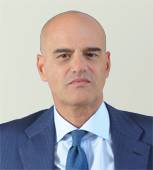Eni's New Head Caught between Russia and New Frontiers
Claudio Descalzi faces a delicate balancing act as he takes the helm of Italian oil major Eni - guaranteeing Italy's gas supply by nurturing relations with Russia, while exploring new drilling frontiers in Africa and Asia to boost profit.
The Italian government's choice of Descalzi, a longtime oil man with more than 30 years experience at the group, gives Eni a leader who is likely to push forward his predecessor Paolo Scaroni's efforts to focus the company on its nuts and bolts business of finding and mining new oil and gas fields.
That could also mean selling down the company's 43 percent stake in Saipem to get the oil service group's debt off its balance sheet and raise more cash to invest.
The bald and burly Descalzi is one of the most respected managers in the so-called E&P, or Exploration and Production, part of the oil business. Royal Dutch Shell recently offered Descalzi a job to become the head of their E&P business, but the Italian government - which owns 30 percent of Eni - persuaded him to stay with the promise of the Italian company's top job, according to people familiar with the matter.
Yet the 59-year-old physics graduate will inevitably have to focus much of his attention on the more geopolitical aspects of the job.
Recent tensions over Russia's seizure of Crimea have revived fears over energy supplies across the European continent. Those concerns loom especially large in Italy, which along with Germany is the biggest customer for Russian gas.
Italy depends on imports to meet 90 percent of the gas it needs to heat its homes and fuel its industry. With no developed nuclear industry, the only alternative to generate power is expensive subsidised renewable energy.
In 2013 Russia supplied Italy with around half of its gas. With Libyan production faltering due to civil war and volumes from Algeria, also a big supplier, dwindling, flows from Russia are being cranked up even higher. At the same time, Russian President Vladimir Putin has warned Europe that without urgent financial aid Ukraine may default on its gas debt and prompt a supply cutoff.
Prime minister Matteo Renzi recently said Eni was crucial to Italy's foreign and intelligence policy.
People who have worked with Descalzi say he is a tenacious manager who can negotiate tough with Moscow if needed.
"He's a fighter, a front man, with a real physical presence. He won't shy away from confrontation," says a person who has worked with the manager.
Those are qualities he will have to use in Kashagan, the giant oil field where Eni was operator in the first phase. The field has been dogged by damaging delays, prompting some people to question Eni's ability to manage large complex projects.
Africa Hand
Descalzi spent much of his early career in Africa, including in Libya, Nigeria and Congo. He is married to a Congolese woman. After taking over as head of Exploration and Production in 2008, he has commuted between London and Milan, working closely with Scaroni to position Eni on the more lucrative exploration and production side of the business. He has streamlined production processes and strengthened the company's portfolio.
In particular, Descalzi has helped the group to spread its wings in Africa. Eni is the biggest foreign oil and gas operator in Africa, traditionally focusing much of its activity in the north, including war-torn Libya. Descalzi has expanded in sub-Saharan areas, including Mozambique.
"Mozambique is the jewel in Eni's crown, the group's biggest ever discovery and Descalzi has had a lot to do with that," said Mediobanca oil analyst Andrea Scauri.
Still, any new resources from Africa are unlikely to find their way into Italian households and businesses. That's because Eni, like others, is channelling gas from new markets to Asia.
For example, as part of a long-term, multi-billion euro gas deal renegotiation in 2012, Eni agreed to convert half the pipeline supply it receives from Algerian state-run Sonatrach into greater numbers of liquefied natural gas (LNG) cargoes, two sources with knowledge of the matter said. Eni now sells gas initially earmarked for Italy to Asia and splits the profit with the Algeria firm.
Even if the gas was not diverted in part to Asia, there are wider concerns that Algeria's future production could be at risk, posing a problem for Italy and other European countries.
A growing population and artificially low energy prices have resulted in acute oil and gas shortages and power blackouts across Egypt, forcing a cut in exports. Analysts say Algeria may be the next in line. Existing long-term gas supply deals between Algeria and Eni are due to expire in 2019 and it's unclear how many will be renewed.
The result, says Claudio Gianotti, head of gas and power trading group World Energy, is that Italy's energy needs will undoubtedly be top of the agenda of Eni's new chief. And "without gas from Algeria and Russia it's impossible for Italy to meet those needs."
(By Stephen Jewkes and Oleg Vukmanovic; Editing by Alessandra Galloni and David Evans)







